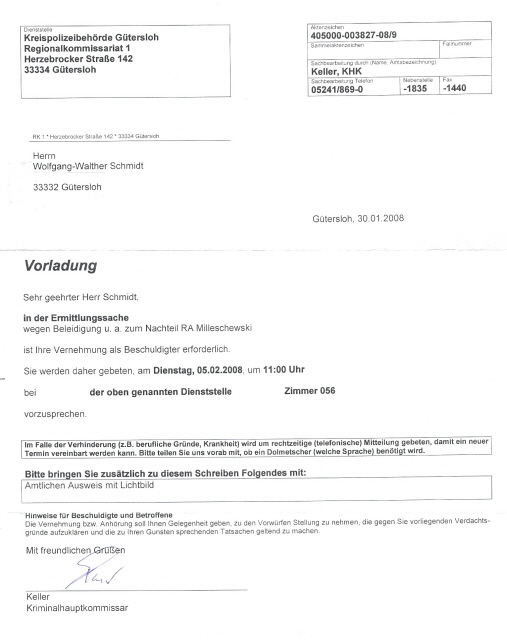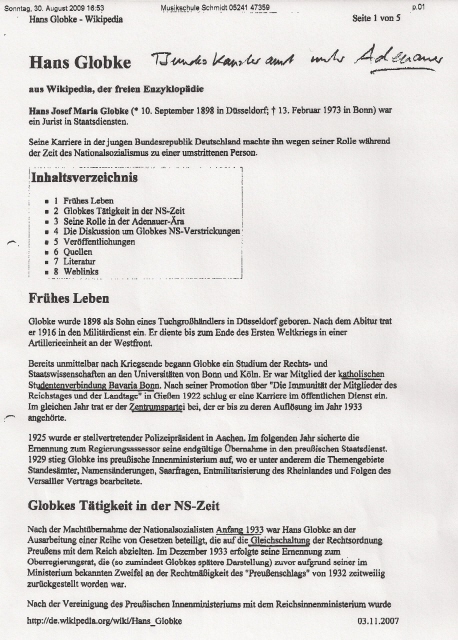Der Krug geht so lange zu Wasser bis er bricht, oder: Es kann nur ein Land auf der
Welt geben, das solche Seilschaften (den Zustand gewisser Parteien) so viele Jahre erträgt Kapitel 1, 4.
April 2008
Die Kriminalgeschichte aus dem Kreis Gütersloh und der Tatsachenroman aus dem
Kreispolizeimilieu münden in ein Kapitel: Angriff auf die freie Meinungsäußerung. (Vgl. das Kapitel 'Demokratische Grundrechte, NRW und ein Kulturfrühstück der FDP in Bielefeld')
Vorladung der Kreispolizeibehörde Gütersloh vom 30. Januar 2008

Dies Kapitel, in dem die Fäden also zusammenlaufen, hat eine Vorgeschichte und einen
Zusammenhang. Bevor der genannte Angriff auf die freie Meinungsäußerung daher genauer
zu betrachten ist (vgl. die am 9.10.2008 erfolgte Aktualisierung der vorstehenden Artikel, die
Kreispolizei Gütersloh betreffend), gilt das Augenmerk der historischen Wahl in Spanien am 9. März 2008, der Wissenschaft und ihrer Gegner und der Entwicklung der deutschen
Republiken.
Gegen Diktaturen und für Demokratie
Im Oktober 1969 werden zwei Mitglieder der Marienkantorei Lemgo - darunter der Verfasser dieses Artikels
- vom Politischen Kommissariat der Polizei Bielefeld festgenommen und verhört. Was war
geschehen? Drei Mitglieder der Marienkantorei Lemgo - die genannten zwei und als dritter
ein Andreas Koderisch, der, nachdem seine Mutter die Namen der Polizei genannt hatte,
feige nach Holland geflüchtet war, dem großen Vorbild (für manche) Wilhelm II. folgend -
hatten gegen die Militärdiktatur in Griechenland (seit 1967) und gegen die faschistische
Diktatur in Spanien (seit 1939) protestiert: "Espana si - Franco no" und "Freiheit für Griechenland". Die deutsche Polizei fackelt nicht lange, sie hat eine Tradition zu verteidigen
(darunter an vorderer Stelle ihre eigene), kriecht vor den Diktaturen und Verbrechern und verfolgt die Demokraten.
Spanien 1936 bis 1939: Militärputsch unter alsbaldiger Führung des Generals Francisco Franco gegen die demokratisch gewählte Regierung der spanischen Republik. Grausamer Bürgerkrieg, in dem die Republik mit kriegsentscheidender Unterstützung der deutschen Luftwaffe, der Legion Condor, zerstört wird. Die Verteidiger der Demokratie zu Hunderttausenden gemordet und verfolgt, bis 1975, dem Tod des Diktators und dem allmählichen Verenden seiner Diktatur. Franco im Jahre 1941: "Als Adolf Hitler - das werde ich ihm nie vergessen - mit dem Einsatz der tapferen deutschen Flieger der Legion Condor unseren Anstrengungen gegen eine Bolschewisierung Spaniens zum Sieg verhalf, da erhob ihn das Schicksal gleichsam zum Schirmherrn der europäischen Zivilisation." Soll heißen: Der Regime nie dagewesener Verbrechen, der Gaskammern, des Niedermähens von Zivilisten mit Maschinengewehren aus Flugzeugen, der Massenerschießungen, der Garrotte etc. Noch im März 1974 werden Urteile gegen Gegner der Franco-Diktatur mit der Garrotte vollstreckt (Salvador Puig Antich, Barcelona, 1948 bis 1974, wäre heute 60 Jahre alt und könnte Bielefeld besuchen). Am 31.10.2007 stimmt das spanische Parlament dem Gesetz der Rehabilitierung von Opfern aus der Zeit des spanischen Bürgerkriegs zu, in welchem erstmals das faschistische Regime Francos offiziell verurteilt wird. 71 Jahre nach dem Beginn des Verbrechens siegt die Demokratie. Am 9. März 2008 gewinnt die PSOE, der Spanien das endlich beschlossene Gesetz und die Verurteilung der Diktatur Francos verdankt, mit für viele überraschend großer Mehrheit die Parlamentswahlen. Die Bevölkerung bestätigt den Sieg der Demokratie über das Verbrechen ausdrücklich und macht die Veränderung dauerhaft, unumkehrbar.
Spanien ist aus eigener Kraft mit der Diktatur fertig geworden, im Unterschied zu den Deutschen. Wenn es auch - wegen der Deutschen, der USA, des Vatikans etc. - und wegen der allgemein bekannten und gefürchteten Grausamkeit der Putschisten und militärischen Sieger im spanischen Bürgerkrieg sehr lange gedauert hat.
Die deutsche politische Polizei (politisches Kommissariat), bis 1945 unter dem Namen Gestapo, verfolgt 1969 Bürger, die sich gegen die neuen und alten faschistischen Regime Europas, Verbündete Hitlers, grausamste Verbrecher bis in die siebziger Jahre stellen. Die deutsche politische Polizei ist durch das spanische Parlament am 31.10.2007 mit verurteilt, unumkehrbar. Die örtliche bzw. regionale Presse Lemgos ("Lippische Rundschau" - Lothar Geißler als Schreiberling - und "Lippische Landeszeitung"), die den Protest gegen Franco etc. 1969 nutzt, um Bürger wegen ihres Eintretens für die Demokratie zu verleumden, zu verunglimpfen (in übelster Weise und Tradition) und zu verfolgen, ist durch das spanische Parlament am 31.10.2007 mit verurteilt. Warum hat keine deutsche Staatsanwaltschaft jemals Anklage gegen diese politische Polizei, aktiv im Interesse der Faschisten, erhoben? Wann werden deren Aktionen endlich im Land selbst verurteilt, nach so langer Zeit wenigstens im Rahmen einer Stellungnahme? Die Zeit hat nicht für die Unbelehrbaren gearbeitet, sondern gegen sie. Es wird nicht etwas besser dadurch, daß es statt gestern vor längerer Zeit geschehen ist. Fast 40 Jahre haben sie Zeit gehabt zur Umkehr, unfähig, unbelehrbar, mit neuen Taten, um die alten zu vertuschen. Nichts ist vergessen. Das Opfer hat überlebt.
Dem Druck, der vom 9. März 2008 in Spanien ausgeht, wird früher oder später auch im Land der Menschenvergaser, der NSDAP mit Adolf Hitler als 'Führer' und des geschichtlich skrupellosesten Militarismus, der Himmlers, Görings, Globkes, Kiesingers, der Ludendorffs, Keitels, Wagners, Harlinghausens, Trettners etc. etc. nicht standzuhalten sein. Die EU ist der Unterpfand.
Zusammenhang von Nationalsozialismus und CDU-Staat: Schüsselstellung im Bundeskanzleramt des "Rasse"-Juristen Hans Globke

NSDAP-Kiesinger als Kanzler war kein Versehen. Er wurde nach einem Globke als Chef des Bundeskanzleramts, den Hitlergeneralen in der Bundeswehr etc. der Bundesrepublik, Europa und der Welt mit Bedacht und Absicht zugemutet. Er verstand seine Wahl und fuhr 1968 zum Staatsbesuch zu Franco. Dort ließ er sich vom faschistischen Diktator in aller Öffentlichkeit dekorieren: Verbunden durch gemeinsame Vergangenheit im Zeichen des "Schirmherrn der europäischen Zivilisation". Ein bundesdeutscher NSDAP-Kanzler empfängt gestanztes Blech aus Henkershand vor den Augen der Welt. Es kann nur eine Nation auf der Welt geben, die das mit sich machen läßt.
Nicht viele Jahre nach Ende des Weltkriegs wurden wieder Panzer und U-Boote gebaut. Bundesdeutsche U-Boote für die griechische Militärdiktatur? Mehr Demokratie wagen? War es falsch, diese Parole Willy Brandts - formuliert unter dem Eindruck einer bundesweiten und unüberhörbaren außerparlamentarischen Opposition gegen eine große Regierungskoalition - wörtlich und ernst zu nehmen?
Willy Brandt stand für den Widerstand gegen Hitler, zusammen mit den Ungebrochenen und Verfolgten der deutschen Arbeiterbewegung, er selbst in Skandinavien, auch in Spanien (als Journalist). Von ihm (von 1969-74 Nachfolger Kiesingers als Kanzler, zuvor in der großen Koalition unter Kiesinger Außenminister), hatte schon Adenauer doppelt diffamierend als von seinem Gegenkandidaten Frahm gesprochen. Der einzige Kanzler der Bundesrepublik, der im Widerstand gegen Hitler aktiv gewesen war, wird wegen seiner antifaschistischen, demokratischen Vergangenheit diffamiert, beschimpft, angegriffen, in übelster Weise von F.J. Strauß. Ausgerechnet die sog. DDR, deren Anerkennung im Interesse einer Entschärfung des 45-jährigen Ost-West-Konflikts, des "Kalten Krieges" Willy Brandt vorantreibt (Grundlagenvertrag 1972), bringt ihn 1974 zu Fall (Affäre G. Guillaume).
Schauen wir daher etwas weiter zurück, um diesen Vorgang zu begreifen.
Die bürgerliche Gesellschaft - die Wissenschaft und ihre Gegner
Seit 1867 - dem Erscheinungsjahr von "Das Kapital" - hat sich das Austragen sozialer Gegensätze verändert. Zunächst: Mit der ökonomischen Krise von 1825 tritt die große Industrie aus ihrem Kindheitsalter und eröffnet den periodischen Kreislauf ihres modernen Lebens. Mit der politischen Krise des Jahres 1830 erobern die bürgerlichen Klassen Frankreichs und Englands politische Macht. "Von da an gewann der Klassenkampf, praktisch und theoretisch, mehr und mehr ausgesprochne und drohende Formen. Er läutete die Totenglocke der wissenschaftlichen bürgerlichen Ökonomie. Es handelte sich jetzt nicht mehr darum, ob dies oder jenes Theorem wahr sei, sondern ob es dem Kapital nützlich oder schädlich, bequem oder unbequem, ob polizeiwidrig oder nicht. ...an die Stelle unbefangener wissenschaftlicher Untersuchung trat das böse Gewissen und die schlechte Absicht der Apologetik." ( Karl Marx, Das Kapital, S.21)
Seit 1867 bewegt sich nicht nur wissenschaftliche Tätigkeit sondern alle Politik in dem
Spannungsfeld, welches durch systematische theoretische Darstellung (und dadurch Kritik)
des Gegenstandes auf eine neue Stufe gehoben ist. Das Naturgesetz läßt es ganz unberührt, ob
über es nachgedacht wird oder nicht. Nicht so das Bewegungsgesetz der Gesellschaft. Die
faschistischen Bewegungen und Regime haben zum Inhalt, was Hitler 1924 vor Gericht (nach
gescheitertem Staatsstreichversuch mit Geiselnahmen, etlichen Toten etc.) als sein
Programm der Vernichtung des Marxismus ausspricht. 'Was mir vor Augen stand, das war
vom ersten Tage an tausendmal mehr, als Minister zu werden. Ich wollte der Zerbrecher des
Marxismus werden. Ich werde diese Aufgabe lösen ...' (Zitiert nach Alan Bullock, Hitler - Eine Studie über Tyrannei, 1953.)
Unter dieser Parole versammelt er die
Anhängerschaft keinesweg nur der NSDAP (bis hin zum "Opus Dei"), wird zunächst weiter
protegiert, noch im selben Jahr 1924 nach einer Haft von kaum neun Monaten entlassen und
kann die verbrecherische Politik, bald auch wieder mit den alten Organisationen, fortsetzen.
Vorausgegangen war in den Jahrzehnten bis 1914, basierend auf enormer ökonomischer, technischer etc. Entwicklung, der Entwicklung des kapitalistischen Weltmarkts in die Breite und Tiefe, ebenfalls ein Aufschwung sozialdemokratischer Organisationen und Parteien, auf internationaler Ebene. Diese Parteien, seit dem 100. Jahrestag der französischen Revolution von 1789, also seit 1889 in der Sozialistischen Internationale verbunden, hatten seit Gründung die menschliche Anwendung von Gewalt, insbesondere die Frage von Krieg und Frieden, thematisiert. Seit dem Stuttgarter Kongreß 1907 (bestätigt in Kopenhagen 1910 und Basel 1912) gehörten folgende Sätze zu den Beschlüssen der Sozialistischen Internationale: "Droht der Ausbruch eines Krieges, so sind die arbeitenden Klassen und deren parlamentarische Vertreter in den beteiligten Ländern verpflichtet, unterstützt durch die zusammenfassende Tätigkeit des Internationalen Sozialistischen Büros, alles aufzubieten, um durch die Anwendung der ihnen am wirksamsten erscheinenden Mittel den Ausbruch des Krieges zu verhindern, die sich je nach der Verschärfung des Klassenkampfes und der allgemeinen politischen Situation naturgemäß ändern. Falls der Krieg dennoch ausbrechen sollte, sind sie verpflichtet, für dessen rasche Beendigung einzutreten und mit allen Kräften dahin zu streben, die durch den Krieg herbeigeführte wirtschaftliche und politische Krise zur Aufrüttelung des Volkes auszunutzen und dadurch die Beseitigung der kapitalistischen Klassenherrschaft zu beschleunigen."
Die so eindeutig und einmütig seit dem Stuttgarter Kongreß 1907 beständig auf größter Bühne (selbstverständlich auch Berichterstattung in der Parteipresse etc.) erklärte Absicht und Politik, sich einem Krieg der entsprechenden Staaten mit vereinten Kräften zu widersetzen und ihn nach Möglichkeit schon im Entstehen (mittels Generalstreik etc.) zu verhindern, zerplatzte in den ersten Tagen der beginnenden Katastrophe im Juli/August 1914 wie eine Seifenblase (vgl. Rosa Luxemburg, Junius-Broschüre - "Junius" ist ihr Pseudonym aus dem Gefängnis). Konsequente Anwendung fanden die Beschlüsse nur bei den Sozialdemokraten Rußlands, der SDAPR (Bolschewiki). Kein Mensch auf unserer Welt, für alle Zukunft, wird bezweifeln können, daß die Bolschewiki richtig analysiert und gehandelt haben. Die Geschichte hat ihr Urteil gesprochen.
Der 4. August 1914 sieht eine SPD, die mit ihrer Zustimmung im Reichstag zu den geforderten Kriegskrediten ihren vollständigen intellektuellen und politischen Bankrott erklärt. Aus dem Angriffskrieg der Mittelmächte - die deutschen Heere sind bereits in Luxemburg und Belgien einmarschiert und die SPD weiß es - macht die Partei der Arbeiterbewegung einen Verteidigungskrieg gegen eine fremde Invasion, um die Existenz des Vaterlandes, um Kultur und einen Freiheitskrieg gegen den russischen Despotismus.
Die Tatsachen sind:
Am 6.07.1914 hat die deutsche Reichsregierung Österreich-Ungarn eine "Blankovollmacht" unbedingter Bündnistreue gegeben.
Am 23.07.1914 stellt Österreich-Ungarn Serbien ein - wegen geforderter Preisgabe serbischer Souveränitätsrechte - unannehmbares Ultimatum.
Am 28.07.1914 erklärt Österreich-Ungarn Serbien
den Krieg, nach erfolglosen Vermittlungsversuchen (Vorschlag einer Botschafterkonferenz und direkter Verhandlungen zwischen Rußland und Österreich-Ungarn). Der deutsche Generalstab drängt Österreich-Ungarn zur Generalmobilmachung und rät seinerseits von Vermittlungsversuchen ab.